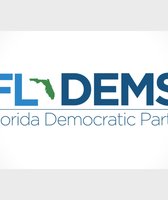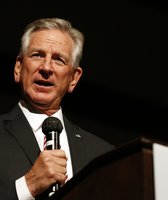Stand up for the facts!
Our only agenda is to publish the truth so you can be an informed participant in democracy.
We need your help.
I would like to contribute
With Election Day approaching, then-candidate Donald Trump traveled to Miami to earn the support of a group of Haitian Americans.
"Whether you vote for me or you don’t vote for me, I really want to be your greatest champion, and I will be your champion," Trump said Sept. 16, 2016, at the Little Haiti Cultural Center.
Flash-forward more than a year later: Trump ordered almost 60,000 Haitians — many of them from Florida — to leave the United States or adjust their immigration status by July 2019.
The Trump administration’s Nov. 20 decision came after a review of the Temporary Protected Status for Haitians who arrived after the 2010 earthquake. This announcement prompted outrage from Republicans and Democrats in Congress, including former U.S. Rep. Gwen Graham, a Democrat in Florida’s governor’s race.
"Donald Trump lied to Florida’s Haitian community on the campaign trail and stabbed them in the back," Graham said in a Nov. 29 news release.
Sign up for PolitiFact texts
We can’t say whether Trump "lied," as Graham asserted. But we wanted to take a closer look at what Trump said and let readers decide for themselves.
Trump never explicitly promised to extend the TPS designation for Haitians, but according to those in the community, Trump’s words that September day meant he would defend Haitians’ interests.
"He turned his back on the Haitian people," said Gepsie M. Metellus, the executive director at Sant La Haitian Neighborhood Center in Miami. "He made a promise, and a promise in Haitian culture is a debt, and he did not live up to his promise."
Trump’s meeting in Little Haiti lasted 26 minutes. In addition to telling the attendees that he wanted to be their "greatest champion," Trump criticized the Clintons’ past involvement in the country and noted that Haiti is still suffering "very badly."
"Clinton was responsible for doing things a lot of the Haitian people are not happy with," Trump said from prepared remarks. "Taxpayer dollars intended for Haiti and the earthquake victims went to a lot of the Clinton cronies."
The Clintons faced a lot of criticism for their involvement with recovery efforts in Haiti after its 7 magnitude earthquake. Former President Bill Clinton served as the United Nations special envoy and helped raise hundreds of millions of dollars for the country; Hillary Clinton traveled to the country multiple times as secretary of state; and the Clinton Foundation raised more than $30 million for recovery projects.
Some of the relief projects didn’t come through, including a $2 million housing expo for new housing units. Other projects, such as a $170 million power plant and port for the Caracol Industrial Park, were besieged by criticism of millions of dollars wasted, displaced farmers and sluggish job growth.
Trump then reiterated his support for Haitians weeks later in Ocala, Fla.
"As Haiti's death toll from Hurricane Matthew is on the rise, we should never forget how Bill and Hillary Clinton handled Haiti the last time," Trump said Oct. 12, 2016. "To all our friends in Little Haiti, they're great people. ... these are people that are incredible. They have the warmest feeling, the warmest heart. But to all of our friends in Little Haiti, your day of justice is coming, believe me. And it arrives on Nov. 8."
The White House did not offer on-the-record clarification of Trump’s campaign remarks.
Advocates in Florida, which has the greatest concentration of Haitian immigrants in the United States, told us that many Haitians understood Trump’s assurances to mean they could stay in the United States.
Many had rebuilt their lives in the country since the earthquake nearly eight years ago.
"The idea was that Trump was supposed to help people find a path to stay here permanently, not force them out of the country," said Linda Tavernier-Almada, the director of education for the Haitian Association Foundation of Tampa Bay. "They’ve been paying taxes.They’ve opened up mom and pop shops. They are our nurses, our interns. Many children have been born here."
Tavernier-Almada did not vote for Trump but she said people in the Haitian community expected Trump to keep his word when he vowed to be their greatest champion.
The idea that Haitian-Americans want to return to the country, Metellus said, "defies all logic."
The Trump administration has defended its decision by pointing to the obvious feature of the status: it’s temporary.
The Department of Homeland Security can decide to award TPS to nationals from countries experiencing civil war, environmental disasters or epidemics — conditions that prevent their safe return. The department periodically reviews the designations and decides to extend or terminate it based on the country’s progress and conditions.
A bipartisan group of Florida lawmakers including both Sens. Marco Rubio and Bill Nelson had appealed to the Trump administration to extend TPS for Haiti months before this announcement, warning that Haiti wasn’t ready for an influx of residents. They said the nation had not fully recovered from the 2010 earthquake and subsequent cholera outbreak, and had been further devastated by Hurricane Matthew in 2016.
Haitians have not been the only population under the department’s scrutiny. Weeks before the Haiti decision, Trump announced the end of Nicaragua’s Temporary Protected Status designation, affecting more than 5,000 people. Other countries currently designated for protection are El Salvador, Honduras, Nepal, Somalia, Sudan, South Sudan, Syria, and Yemen.
South Florida representatives from both sides of the aisle including Carlos Curbelo, Frederica Wilson, Ileana Ros-Lehtinen and Alcee Hastings have introduced legislation to help the populations affected by the administration's recent actions.
The Extending Status Protection for Eligible Refugees Act, or ESPERER Act ("esperer" is French for "hope"), would grant permanent residence to TPS recipients from Haiti, Nicaragua, El Salvador, or Honduras who have not been convicted of serious crimes.
The bill still has a long way to go before it will be voted on, if at all. It was introduced in the House in late October and has not been heard by any committees.
Our Sources
Interview, Linda Tavernier-Almada, the director of education for the Haitian Association Foundation of Tampa Bay, Dec. 6
Interview, Gepsie M. Metellus, the executive director at Sant La Haitian Neighborhood Center, Dec. 7
Email exchange, Matt Harringer, Graham spokesman, Oct. 6
Miami Herald, Donald Trump to Haitian voters: I want to be your greatest champion, Sept. 16, 2016
PolitiFact, Trump mangles facts on Clinton and Haiti jobs project, Oct. 11, 2016
PolitiFact, Trump’s decision on Haitian immigrants: What does it mean?, Nov. 21
PolitiFact, Donald Trump extended Temporary Protected Status for Haitians. Here's what that means, May 22
Washington Post, Did the Clinton Foundation raise ‘hundreds of millions of dollars’ for a hospital in Haiti that was never built?, July 13, 2016
Press release, Graham: Haitians with Temporary Status Deserve to Stay, Nov. 29














































